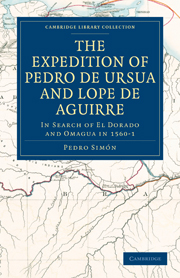 The Expedition of Pedro de Ursua and Lope de Aguirre in Search of El Dorado and Omagua in 1560–1
The Expedition of Pedro de Ursua and Lope de Aguirre in Search of El Dorado and Omagua in 1560–1 Book contents
- Frontmatter
- Contents
- INTRODUCTION
- CHAPTER I
- CHAPTER II
- CHAPTER III
- CHAPTER IV
- CHAPTER V
- CHAPTER VI
- CHAPTER VII
- CHAPTER VIII
- CHAPTER IX
- CHAPTER X
- CHAPTER XI
- CHAPTER XII
- CHAPTER XIII
- CHAPTER XIV
- CHAPTER XV
- CHAPTER XVI
- CHAPTER XVII
- CHAPTER XVIII
- CHAPTER XIX
- CHAPTER XX
- CHAPTER XXI
- CHAPTER XXII
- CHAPTER XXIII
- CHAPTER XXIV
- CHAPTER XXV
- CHAPTER XXVI
- CHAPTER XXVII
- CHAPTER XXVIII
- CHAPTER XXIX
- CHAPTER XXX
- CHAPTER XXXI
- CHAPTER XXXII
- CHAPTER XXXIII
- CHAPTER XXXIV
- CHAPTER XXXV
- CHAPTER XXXVI
- CHAPTER XXXVII
- CHAPTER XXXVIII
- CHAPTER XXXIX
- CHAPTER XL
- CHAPTER XLI
- CHAPTER XLII
- CHAPTER XLIII
- CHAPTER XLIV
- CHAPTER XLV
- CHAPTER XLVI
- CHAPTER XLVII
- CHAPTER XLVIII
- CHAPTER XLIX
- CHAPTER L
- CHAPTER LI
- CHAPTER LII
CHAPTER XLVIII
Published online by Cambridge University Press: 05 November 2011
- Frontmatter
- Contents
- INTRODUCTION
- CHAPTER I
- CHAPTER II
- CHAPTER III
- CHAPTER IV
- CHAPTER V
- CHAPTER VI
- CHAPTER VII
- CHAPTER VIII
- CHAPTER IX
- CHAPTER X
- CHAPTER XI
- CHAPTER XII
- CHAPTER XIII
- CHAPTER XIV
- CHAPTER XV
- CHAPTER XVI
- CHAPTER XVII
- CHAPTER XVIII
- CHAPTER XIX
- CHAPTER XX
- CHAPTER XXI
- CHAPTER XXII
- CHAPTER XXIII
- CHAPTER XXIV
- CHAPTER XXV
- CHAPTER XXVI
- CHAPTER XXVII
- CHAPTER XXVIII
- CHAPTER XXIX
- CHAPTER XXX
- CHAPTER XXXI
- CHAPTER XXXII
- CHAPTER XXXIII
- CHAPTER XXXIV
- CHAPTER XXXV
- CHAPTER XXXVI
- CHAPTER XXXVII
- CHAPTER XXXVIII
- CHAPTER XXXIX
- CHAPTER XL
- CHAPTER XLI
- CHAPTER XLII
- CHAPTER XLIII
- CHAPTER XLIV
- CHAPTER XLV
- CHAPTER XLVI
- CHAPTER XLVII
- CHAPTER XLVIII
- CHAPTER XLIX
- CHAPTER L
- CHAPTER LI
- CHAPTER LII
Summary
1. At first the soldiers of Merida did not think that their captain ought to have accepted the offices he did, and that he ought not to march under the governor's banner, but rather go independently, as he came from another district, under his own flag, and with his own followers, to do what lay in his power, or even to show prodigies of valour.
But Pedro Bravo, by accepting the several important offices, considered he was acting in accordance with the rules of honour, as well as for the benefit of himself and his men, and, in truth, he served his king right well in all he did.
The governor, still considering that he had not conferred sufficient honours on Bravo, offered likewise to assist his soldiers and followers in anything they required. Some of the soldiers, in order to find out to what point the governor's liberality extended, rather than that they required it, said, although they had come most willingly to serve the king at their own expense, and what they required they were willing to pay for, they would, however, accept from his generous hands what they were much in want of, namely, shoes for their horses. The governor sent orders to a merchant to give each soldier, on his account, a dozen horseshoes, with corresponding nails; he, however, gave instructions that they were only to have the horseshoes and nothing else; and with this present he considered they were abundantly provided, and at little cost. Bravo's soldiers thanked the governor for his offer, but, as it really was not their wish to accept anything, the governor's offer of the horseshoes amused them.
- Type
- Chapter
- Information
- The Expedition of Pedro de Ursua and Lope de Aguirre in Search of El Dorado and Omagua in 1560–1Translated from Fray Pedro Simon's Sixth Historical Notice of the Conquest of Tierra Firme by William Bollaert, pp. 211 - 216Publisher: Cambridge University PressPrint publication year: 2010First published in: 1861
